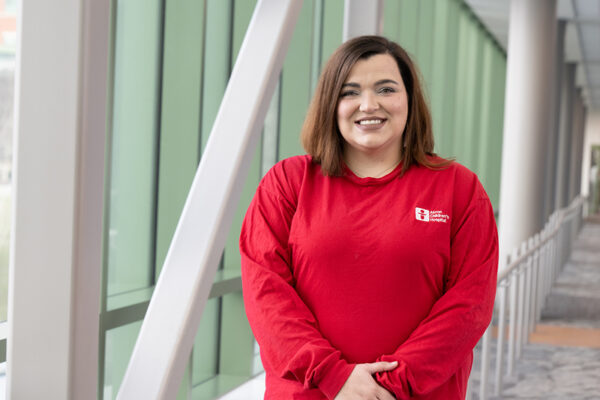
Kate Johnson is a radiologist support specialist at Akron Children’s.
As a child, Kate Johnson experienced an array of symptoms, from difficulty breathing to dexterity and mobility issues, and her providers struggled to find a diagnosis.
“It was frustrating,” she said. “Having a rare disease so young is very difficult in many ways. People may not believe someone so young, when it comes to something they can’t see.”
After transferring her care to Akron Children’s, she started to unravel the mystery behind her illness, as she received physical and occupational therapy.
“I finally got in front of the right people,” she said. “The first place where I actually got some answers was here at Akron Children’s. It helped formulate the steps to get diagnosed later as an adult.”
At age 22, her symptoms worsened, and she discovered a lump on her breast. After her biopsy revealed the beginning stages of breast cancer, she was referred to a geneticist, where she finally received her diagnosis: PTEN Hamartoma Tumor syndrome (PHTS), a rare genetic condition that causes increased risk for certain cancers, benign growths and neurodevelopmental conditions. Kate has a subcategory of PHTS, called Cowden syndrome.
“Most people have two of the PTEN genes, but I lack one completely, and the other is mutated,” she said. “PTEN patients are like snowflakes. There’s no two alike. We go through things similarly, but it’s very difficult for doctors to diagnosis and differentiate, because we’re all so different.”
Prone to rapid tumor growth, Kate is high-risk for 7 different types of cancers, and at age 25, she was diagnosed with stage 1 endometrial cancer.
“I remember that I was diagnosed on Feb. 4, 2019, because that’s World Cancer Day,” she said. “I had a hysterectomy, and 17 days later, I had a preventative double mastectomy and reconstructive surgery. Breast cancer is the greatest risk for someone with Cowden Syndrome. One of the lower risks is endometrial cancer, and since I already had that one, I wanted to take the biggest threat off the table.”
Now, at age 29 and in remission, Kate is a radiologist support specialist at Akron Children’s. She said her experiences motivated her to pursue a career in health care.
“I have such a passion for patient care and the individual needs of the patient,” she said. “My number one passion — the reason I get up every day — is I want to help. I feel like being here with my experiences and my rare disease, I can be of service.”
Kate recently joined the Akron Children’s All Abilities Employee Resource Group, an employee-led group dedicated to promoting inclusion and access for employees, patients and families. She said it’s provided an avenue to raise awareness and discuss the challenges of living with a rare disease.
“Kindness and empathy are so important,” she said. “Asking non-invasive questions helps those with rare diseases to feel seen. This is one of the most inclusive places I’ve ever worked, and I appreciate that. If you ask questions with kindness, you’ll be met with a kind answer. It may end up helping that person down the road. You’d be surprised how much you can learn just by talking with people.”
She added that for patients living with a rare disease, a strong support system is crucial for their mental health.
“The thing that helps me the most is my support system at home,” she said. “I run a Facebook group for people with Cowden Syndrome, called ‘PTEN Cahoots.’ It was founded on the premise that we all need help, and it is OK to seek it in other patients, who now have become like family. Positivity in the darkest days for us is everything.”
Feb. 28 is Rare Disease Day, a time to raise awareness and advocate for care for those living with rare diseases.
“Awareness is everything,” Kate said. “We don’t have a cure for this yet. Maybe these conversations will inspire research. With awareness, you get cures. You get aides to help you manage diseases. Even if it’s not my disease, I still think that’s wonderful.”










